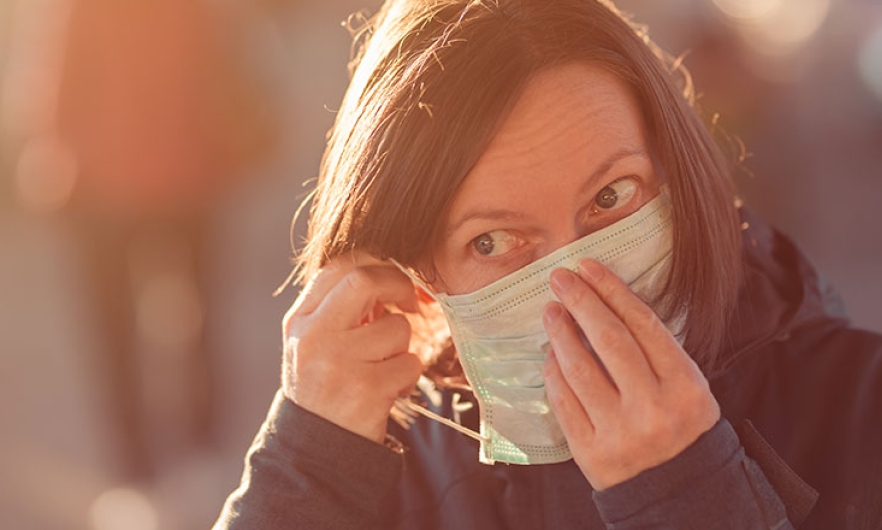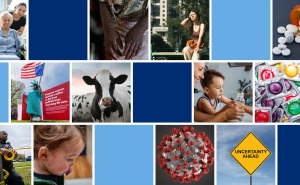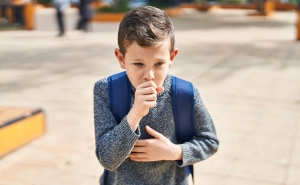The Delta Variant: I’m Vaccinated. Should I Wear A Mask?
For fully vaccinated people, risks from delta vary. It’s unvaccinated people who should be most concerned.

Q&A WITH DAVID DOWDY
In a recent Twitter thread, you wrote that if vaccines are around 90% effective, a fully vaccinated person’s risk of getting COVID this August is about the same as it was for an unvaccinated person in June. In June, CDC guidance stated that unvaccinated people should be wearing masks at all times, practicing social distancing, and avoiding crowded indoor spaces. Should fully vaccinated people be going back to these behaviors too?
First of all, it’s important to recognize that even though everyone’s risk is going up as transmission increases, that risk is highest among the unvaccinated. In many states, only 1% or 2% of all confirmed cases are among people who are fully vaccinated. So if you haven’t gotten the vaccine yet, that’s the most important thing you can do.
But even for those who have been vaccinated, it probably does make sense to be a bit more cautious. With cases going up across the country, any measures we take now will help limit the number of people who get sick in the weeks to come.
We’re all in this together: When transmission goes up, everyone’s risk goes up. And when that happens, it’s also important to send a message to each other that this virus is a serious threat by doing things like wearing a mask and avoiding large, crowded indoor events—even if you personally have been vaccinated.
If you live in an area without a mask mandate, what should you look for to assess personal risk?
First of all, if you’re not vaccinated, there’s no better time to get the shot. Not only is the risk of [getting] COVID going up, but as more and more people get vaccinated, the clearer it is that these vaccines are incredibly effective—including against the delta variant—and also incredibly safe.
Next, you can check the CDC’s COVID transmission map to see the level of transmission in your area. Then, you should think about the amount of contact you’re having with others and try to reduce the amount of time you’re in close contact—especially indoors with people who may be unvaccinated.
Wearing a mask is helpful, but even in places without a mask mandate, there are lots of things you can do to lower your personal risk.
Should fully vaccinated parents be concerned about their unvaccinated children?
There are two issues here. The first is the risk of unvaccinated kids getting COVID themselves. This is definitely a risk, but even now the rate of confirmed cases among kids is lower than among 18–40-year-olds. And while anyone can get seriously ill if they get COVID, younger kids in general get less sick than older adults. So, yes, kids can get sick from this disease, and it’s important for them to take precautions when possible—for example, having unvaccinated kids wear masks indoors—but the risk to kids is much lower than to unvaccinated adults.
The second issue is the possibility that kids can transmit COVID-19 to fully vaccinated family members. Again, this can happen, but the biggest concern would be when kids are in contact with family members who either aren’t fully vaccinated, or who are vaccinated but have serious underlying medical conditions and need to avoid even the small risk of a breakthrough infection. In these cases, it’s even more important to take precautions to prevent kids from getting infected in the first place—and also to make sure that any unvaccinated family members get vaccinated as soon as possible.
The CDC says that fully vaccinated people should get tested and wear a mask after being exposed to COVID-19. If you live in or are traveling to an area with particularly high transmission, should you treat that as a possible exposure?
Your level of exposure depends on both the level of transmission in an area and the amount of contact you have with other people. So even in areas with lower transmission, attending densely packed indoor events should be considered a potential exposure.
Similarly, if you travel to an area with higher transmission but are fully vaccinated and take appropriate precautions—avoiding close indoor contact, wearing a mask indoors—your level of exposure is probably low. The biggest concern would be traveling to areas of high exposure AND attending events that would put you in close contact with lots of other people, especially indoors. In these sorts of settings, you can’t count on the vaccine alone to protect you.
People may get the wrong idea that vaccines don’t work or that it’s not worth the risk of side effects if you might end up getting COVID anyway. What’s wrong with these takeaways?
First of all, vaccines absolutely work. As mentioned earlier, in states where data are available, generally only 1%–2% of confirmed COVID cases are among people who are fully vaccinated—even though 60% of the adult population is fully vaccinated by now. And since the vast majority of COVID cases in the U.S. are [currently from the] delta variant, this means that our current vaccines are extremely effective against the delta variant as well. Second, the risk of long-term side effects after COVID are real, and can occur in 10% or more of all people who get infected. By contrast, long-term side effects after COVID vaccines are extremely rare—meaning that if your long-term health is your #1 priority, it’s much safer for you to get the vaccine than to run the risk of getting COVID.
What advice do you have for unvaccinated people who are still deciding if the vaccine is right for them?
There are lots of logical reasons people might have for waiting to get the vaccine. For example, some people might have had bad experiences with the medical system in the past, or had side effects with other vaccines. But as time goes by, I think we’re getting more and more data that these vaccines are very safe: Hundreds of millions of people have gotten vaccinated by now, and the levels of serious side effects are extremely low. And as case counts go up, the benefits of getting vaccinated are growing every day.
Don’t take it from me—talk to someone you trust, especially someone who has gotten the vaccine and can tell you what the experience is like. Everyone deserves to be protected from this disease, and getting a COVID vaccine can take a lot of worry off your plate in this challenging time.
David Dowdy, MD, PhD ’08, ScM ’02, is an associate professor in Epidemiology at the Johns Hopkins Bloomberg School of Public Health.





